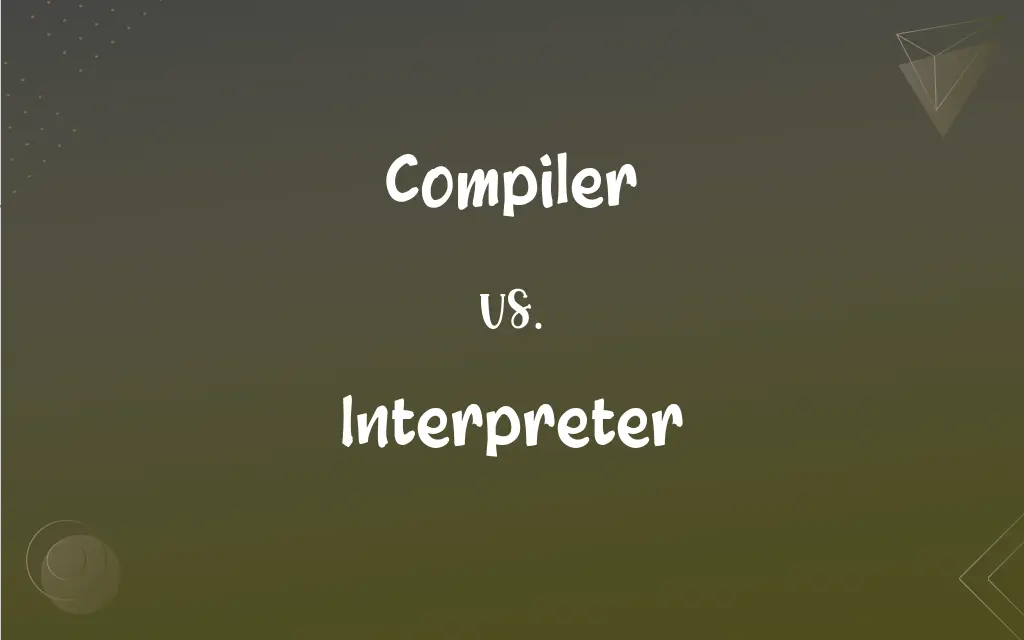Compiler vs. Interpreter: What's the Difference?
Edited by Janet White || By Harlon Moss || Updated on October 17, 2023
A compiler translates an entire program's source code into machine code at once, while an interpreter translates and executes source code line-by-line at runtime.

Key Differences
A compiler is a program that translates the entire source code of a higher-level programming language into machine or byte code in a single go. An interpreter, on the other hand, translates the source code line-by-line and executes it simultaneously during runtime.
When using a compiler, the source code undergoes a full transformation before execution, resulting in an independent executable file. With an interpreter, no separate executable is generated; instead, the interpreter must be invoked each time the program runs.
Compilation with a compiler generally takes longer initially because it processes the entire code. However, the execution of the resulting code is often faster. In contrast, an interpreter might start executing code faster, but the overall runtime can be slower due to line-by-line interpretation.
An advantage of compilers is that they can optimize code, which can lead to more efficient execution. Interpreters, however, offer better flexibility during development, as they can facilitate immediate feedback and easier debugging since they process code incrementally.
Error handling differs between a compiler and an interpreter. A compiler will generally list all errors after trying to compile the code, preventing the generation of an executable until all are fixed. An interpreter will halt upon encountering the first error, necessitating its correction before continuing.
ADVERTISEMENT
Comparison Chart
Translation Timing
Translates all at once
Translates line-by-line at runtime
Execution File
Generates an independent executable
No separate executable; relies on interpreter each time
Speed
Slower initial compilation but faster execution
Faster start but slower execution due to real-time parsing
Feedback & Debugging
Errors shown after compilation
Immediate feedback; stops at the first error
Dependency
Produces platform-dependent executables (usually)
Platform-independent, but needs the interpreter
ADVERTISEMENT
Compiler and Interpreter Definitions
Compiler
A tool that translates source code into machine code.
The developer used a compiler to convert her C++ program into an executable.
Interpreter
Software that parses and executes code without a separate compilation step.
Using an interpreter, she tested different algorithms quickly.
Compiler
A software that produces an executable from programming code.
With a good compiler, optimized and efficient executables can be produced.
Interpreter
A program that executes code line-by-line in real-time.
Python is often run using an interpreter, allowing for immediate code execution.
Compiler
An application that turns human-readable code into computer-readable format.
She preferred a compiler that provided detailed error messages during the build process.
Interpreter
A tool translating and running source code simultaneously.
He debugged his script with the interpreter to catch errors on the fly.
Compiler
A program that transforms high-level language into lower-level language.
After writing the software, he ran the compiler to generate machine code.
Interpreter
A program that facilitates immediate feedback by processing code incrementally.
For rapid prototyping, the interpreter proved invaluable due to its immediate feedback mechanism.
Compiler
A tool converting entire programs for execution without the original code.
For his game, he chose a compiler that specifically targeted gaming consoles.
Interpreter
A tool for executing high-level language directly.
With an interpreter, the developer could run and modify the code without constantly recompiling.
Compiler
One that compiles
A compiler of anthologies.
Interpreter
One who translates orally from one language into another.
Compiler
(Computers) A program that translates another program written in a high-level language into machine language so that it can be executed.
Interpreter
One who gives or expounds an interpretation
"An actor is an interpreter of other men's words, often a soul which wishes to reveal itself to the world" (Alec Guinness).
FAQs
What is a compiler?
A compiler is a software program that translates code written in high-level programming languages into machine code that's directly executable by a computer's CPU.
How does a compiler work?
A compiler works in multiple stages including lexical analysis, syntax analysis, semantic analysis, optimization, and code generation, ultimately converting high-level source code into low-level machine code.
What languages use compilers?
Commonly compiled languages include C, C++, C#, and Java (to bytecode).
Is Java compiled or interpreted?
Java is both. The Java compiler translates source code into bytecode, and the Java Virtual Machine (JVM) interprets or JIT compiles this bytecode into machine code at runtime.
Why is compiled code generally faster?
Compiled code is generally faster because it's translated directly into machine code, allowing the program to execute directly on the hardware without further translation.
What is an interpreter?
An interpreter is a program that directly executes instructions written in a programming or scripting language, without requiring them to be compiled into machine code.
How does an interpreter work?
An interpreter executes code line by line, translating each statement into machine code, and immediately executing it, rather than converting the entire program at once like a compiler.
Can you modify a program while it's being interpreted?
Yes, interpreted languages allow for more dynamic execution, meaning you can modify the program while it's running.
What is the role of the interpreter in Python?
The Python interpreter reads and executes Python code directly, line by line, enabling Python's renowned flexibility and ease of prototyping.
What is an example of a runtime error in interpreted languages?
A "NameError" in Python is a common runtime error, occurring when the code attempts to use a variable or function name that hasn't been previously defined.
What is JIT compilation?
JIT, or Just-In-Time compilation, compiles code in real-time, or "just in time" for execution, offering a balance between traditional interpreted and compiled execution models.
Are interpreted programs slower than compiled ones?
Generally, yes, because the interpreter processes code line by line, which adds overhead compared to running pre-compiled machine code.
What is the difference between a compiler and an interpreter?
The primary difference is that a compiler translates high-level code into machine code all at once, while an interpreter translates and executes code line by line.
What is an example of a compiler error?
A "syntax error" is a common compiler error, occurring when the programmer has typed something that violates the grammatical rules of the programming language.
What is bytecode?
Bytecode is an intermediate code between source code and machine code, often used by interpreters (like the Java Virtual Machine) for executing a program.
Do interpreters produce machine code?
Interpreters don't produce machine code as an end product. They translate source code into machine code on the fly during execution.
Can you modify a program while it's being compiled?
No, changes cannot be made to the program during the compilation process; you must wait until compilation completes, make changes, and then recompile it.
What is cross-compilation?
Cross-compilation is the process of compiling code for one platform (target) on a different platform (host).
What is an interpreted language's main advantage?
The main advantage is flexibility, as they allow for dynamic typing, ease of debugging, and immediate execution without the need for compilation.
What languages use interpreters?
Commonly interpreted languages include Python, Ruby, and PHP.
About Author
Written by
Harlon MossHarlon is a seasoned quality moderator and accomplished content writer for Difference Wiki. An alumnus of the prestigious University of California, he earned his degree in Computer Science. Leveraging his academic background, Harlon brings a meticulous and informed perspective to his work, ensuring content accuracy and excellence.
Edited by
Janet WhiteJanet White has been an esteemed writer and blogger for Difference Wiki. Holding a Master's degree in Science and Medical Journalism from the prestigious Boston University, she has consistently demonstrated her expertise and passion for her field. When she's not immersed in her work, Janet relishes her time exercising, delving into a good book, and cherishing moments with friends and family.































































